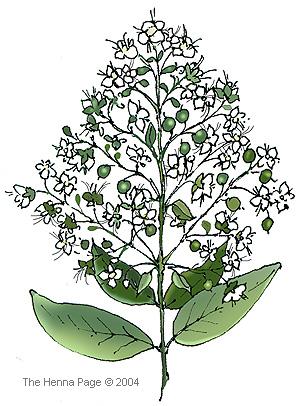|
Catherine Cartwright-Jones © 2004  "My
Beloved is unto me as a cluster of Camphire in the vineyards of En-Gedi"
Song of Solomon, I, 14. Rashi, a Jewish scholar from 11th c France, interpreted this passage that the clusters of henna flowers were a metaphor for forgiveness and absolution, showing that God forgave those who tested Him (the Beloved) in the desert. Henna was grown as a hedgerow around vineyards to hold soil against wind erosion in Israel as it was in other countries. A henna hedge with dense thorny branches protected a vulnerable, valuable crop such as a vineyard from hungry animals. The hedge, which protected and defended the vineyard, also had clusters of fragrant flowers. This would imply a metaphor for henna of a "beloved", who defends, shelters, and delights his lover. In the first millennium BCE, in Canaanite Israel, henna was closely associated with human sexuality and love, and the divine coupling of goddess and consort. More clearly descriptive of the sexual associations of henna is, "I
am my beloved's,
Pomegranate and henna blossoming time would have occurred in late April
or early May, when the
weather is warm but not hot in Israel. It is a time when one
would be comfortable outdoors, wearing little or no clothing.
Henna trees are short and bushy, providing potential outdoor privacy
for two people. "Lodging among the henna shrubs" would only
be possible if two people were sitting or lying down. Since henna
branches have thorns, a person would be encouraged to stay low. The
flowering henna bushes would have made an intensely fragrant bower for
two young lovers hoping for some private moments with each other, on
the
excuse that they were going out to tend the vineyards.ans his desire is for me. Come, my beloved, Let us go into the open, Let us lodge among the henna shrubs, Let us go early to the vineyards, Let us see of the vine (henna) has flowered, If its blossoms have opened, If the pomegranates are in bloom." Song of Songs 7:11-13 In the Song of Solomon, IV, 13, King David, or the beloved, is praised as: "Your shoots are a royal garden full of pomegranates With choice fruits: Camphire and spikenard" The scholar Metzudat David interprets this as a metaphor for wisdom and good deeds of the wisest and most righteous people being widely influential, as the fragrance of the henna blossom cluster carries to a distance. The Roman soldiers garrisoned in Jerusalem during the first century CE commented that henna blossoming time was the best time to visit the poorer quarters, as the flowers' scent masked the usual stenches. Henna Blossoms are so fragrant, they've been used in perfumes since 1500 BCE. They were the Prophet Mohammed's favorite scent. Henna flower attars are called Gulhina Attar and are produced commercially in Uttar Pradesh, India. Click HERE to investigate henna flower perfumes For more
information on cultivating and using fresh henna, see:
Henna in the Bible The Henna Plant Closeup Henna Flowers Commercial Henna Growing Germinating Henna Seeds Growing Henna in the House Henna Farming in India Henna Farming in Pakistan Lawsone Milling Henna Leaves Use Fresh Henna Leaves Return to the Index of Henna: Lawsonia Inermis References: Abid & Company (Pvt) Ltd. Lahore, Pakistan: Jamila Henna Bakshi, G Flora of the Murshidabad District, West Gengal Scientific Publishers, Jodhpur, India, 1984 Hepper, N., and Friis, I. Field, H. Body Marking in Southwestern Asia Peabody Museum of Archaeology and Ethnology, Harvard University, 1958 Hepper, N., and Friis, I. The Plants of Pehr Forsskal's "Flora Ageyptiaco-Arabica" Royal Botanic Gardens, Kew, in association with the Botanical Museum, Copenhagen In the Temple of Solomon and the Tomb of Caiaphas Biblical Archaeology Society 1993 The Perfume Industry of Mycenaean Pylos Paul Astroms Forlag, Goteborg, 1985 Zecharia Douri Eshkol ha Kofer Israel Can't find what you're looking for? Try: The Henna Page Main Index http://www.hennapage.com/henna/mainindex.html the Encyclopedia of Henna Catherine Cartwright-Jones c 2000 registered with the US Library of Congress TXu 952-968 |